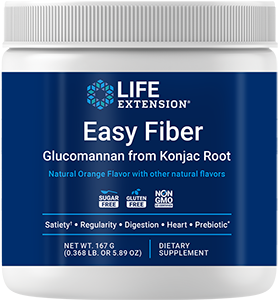
When to Take Fiber Supplements
Published: June 2023
Fiber! You’ll want to shout it from the rooftops because, let's be honest, who doesn't want to poop better? This simple but vitally important nutrient affects the overall rate and quality of your digestion, supporting healthy bowel movements.
But did you know that aside from supporting healthy regularity, total fiber is also good for your overall long-term health in many other ways? Like maintaining already-healthy cholesterol levels, promoting heart health, weight management and more.
Here's the lowdown on fiber, whether you can get enough from food, and how to choose the right supplement to support your body's needs.
What are fiber supplements?
Fiber supplements are available in many forms, including powders, capsules, tablets, gummies, and bulk ground psyllium husk, and help fill nutritional gaps in fiber intake. While getting fiber from whole foods is critical, adding fiber as a dietary supplement is a good way to cover your bases. A high-fiber diet remains one of the best ways to support your health because it has many benefits.
The most popular fiber supplements contain psyllium husk (or psyllium), methylcellulose, or polycarbophil. Additionally, glucomannan is now available in supplement form, and is considered a particularly innovative way to get your fiber and promote regularity, encourage satiety and get other benefits of fiber like supporting heart health and already-healthy blood sugar levels.
Regardless of its source, the fiber found in supplements is called functional fiber. And while each type of fiber works slightly differently, they are all considered safe for daily use. Evidence shows that consuming a fiber supplement like psyllium or glucomannan is generally safe. In fact, if you are not getting enough fiber in your diet, you should take a fiber supplement!
Types of Fiber
Fiber attracts water in your intestines, but it works to soften stools by bulk-forming, helping food pass more quickly through your digestive system. It helps to remove waste more smoothly and efficiently. There are two types of fiber in foods (and supplements) that help promote health: soluble fiber and insoluble fiber.
Soluble Fiber:
Soluble high-fiber foods include psyllium husk or chia seeds and nuts, seeds, beans, oat bran, and barley. It dissolves in water and is gel-forming. Guar gum is another example of soluble fiber commonly used in the kitchen and added to prepared and processed foods.Insoluble fiber:
Insoluble fiber-rich foods include wheat bran, whole grains, and vegetables such as cauliflower, broccoli, and spinach. Insoluble fiber does not dissolve in water.
The benefits of fiber supplements
The health benefits of taking fiber supplements are plentiful. Dietary fiber is part of a plant (yes…vegetables, fruits, legumes, and whole grains) that your body cannot digest or absorb.
Soluble fiber provides food for the good bacteria (healthy microorganisms) in your gut, so they can thrive. For that reason, it's considered a prebiotic, supporting gut health as well as your personal microbiome and overall health.
In addition to supporting healthy digestion, here are three additional benefits of optimal fiber intake.
1. Maintains a healthy ticker:
Adding dietary fiber supplements helps support heart health by binding with cholesterol in the intestines. This process helps you maintain healthy cholesterol levels.
2. Healthy weight management:
Fiber supplements like psyllium manage weight by making you feel full and curbing your appetite. This helps you stay satisfied longer and stops you from snacking between meals. And because you feel fuller at mealtimes, you are less likely to overeat, consuming fewer calories.
3. Keeps already-healthy blood sugar levels in check:
Another extraordinary benefit of fiber supplements is that they help slow digestion and, in doing so, slow down the absorption of carbohydrates, thereby supporting healthy blood sugar levels.
Explore Our Best Digestive Health Supplements
How do fiber supplements work?
Fiber supplements (as well as fiber intake from food) help maintain regularity and normal bowel function by increasing the weight and softness of your stool and speeding up its movement through the intestines. Consuming insoluble fiber will directly affect food digestion rate, stool movement through the colon, and the absorption of nutrients.
Who should take fiber supplements?
The answer is simple: everyone should take a fiber supplement! Nearly 97% of American men and 90% of American women do not meet their dietary soluble fiber needs. That is almost 100% of everybody! A massive portion of the population is missing out on a critical substance that could significantly support their health.
The Institute of Medicine recommends an adequate intake (AI), or a dietary reference intake (DRI) for total fiber. These numbers are conservative and are not designed for “optimal health.” The recommended AI is enough to experience the benefits of fiber, but is more fiber better? Maybe. So, consuming more fiber than the recommendations below would be ideal. (You'll note that the recommended daily amount decreases the older you get—yet, in your golden years, you might find it even more challenging to obtain soluble fiber from your diet for various reasons.)
- Adult males < 50 years old – 38 grams/day
- Adult females < 50 years old – 25 grams/day
- Adult males > 50 years old – 30 grams/day
- Adult females > 50 years old – 21 grams/day
These numbers might not sound daunting, but check out these examples of dietary fiber in some of your favorite foods.
- Slice of whole grain bread – 1.9 grams
- ½ cup of cooked brown rice – 1.8 grams
- 1 apple with skin – 4.5 grams
- ½ cup cooked broccoli – 2.5 grams
So, we're not just a bunch of slackers: clearly, eating enough whole grains and getting enough fiber from your everyday diet alone is tough! You'd have to eat many slices of bread and apples throughout your day to even come close to the recommended amount. So, in addition to a fiber supplement, add some quinoa! You can also try adding chia seeds, flax seeds, or oat bran into your kitchen regimen. But even with these add-ons, you'll probably still need to supplement. No, fiber supplements should not replace a healthy, well-balanced diet—but this supplement will help you meet and even exceed your total fiber needs every day.
When should you take fiber supplements?
You should begin taking them now to support your overall health goals. And because fiber is so powerful at supporting heart health and healthy blood sugar levels, the sooner you start taking supplements, the sooner you take a step toward a more youthful, energized life.
Fiber supplements can be taken anytime during the day, with or without food—though many do prefer to take their fiber with meals.
What’s the best way to take fiber supplements?
Gradually introduce a soluble fiber or insoluble fiber supplement into your daily routine. Too much of a good thing isn't always great when it comes to fiber intake! If your body isn't used to fiber, adding too much dietary fiber can cause digestive discomfort. Drink plenty of water throughout the day to avoid these unpleasant feelings.
Increase your fiber intake slowly, over a period of a month. For example, if the dosing of your fiber supplement is 2-3 scoops, always start with the smallest dose and increase gradually to work up to the optimal dose. Here's a peek at what that might look like:
- Week one: ½ a scoop
- Week two: 1 full scoop
- Week three: 1.5 scoop
- Week four: 2 scoops
How long does it take for fiber supplements to work?
Suppose you are taking soluble dietary fiber supplements for promoting regular bowel movements and obtaining digestive health benefits. And really, an overall healthy digestive system! In that case, you should start noticing a change in your digestion for the better, anywhere from three days to three weeks.
Remember that several factors can impact regularity. You should contact your doctor if you're unsure whether you should take a fiber supplement.
You can also take a quiz to determine your digestive health needs.
About the Author: Krista Elkins has 20 years of experience in healthcare, both as a paramedic (NRP) and registered nurse (RN). She has worked on both ground and helicopter ambulances (CCP-C, CFRN), and in ER, ICU, primary care, psychiatric, and wilderness medicine. She practices and has a devoted life-long interest in preventative medicine. She is a conscientious, research-driven writer who cares about accuracy and ethics.
References
- Mikentinas, Derek C., et al. "Fiber intake predicts weight loss and dietary adherence in adults consuming calorie-restricted diets: the POUNDS lost (preventing overweight using novel dietary strategies) study." J Nutr. October 2019. https://pubmed.ncbi.nlm.nih.gov/31174214/
- Thompson, Sharon V., et al. "Effects of isolated soluble fiber supplementation on body weight, glycemia, and insulinemia in adults with overweight and obesity: a systematic review and meta-analysis of randomized controlled trials." Am J Clin Nutr. December 2017. https://pubmed.ncbi.nlm.nih.gov/29092878/
- Van der Schoot, Alice, et al. "The effect of fiber supplementation on chronic constipation in adults: an updated systematic review and meta-analysis of randomized controlled trials." Am J Clin Nutr. October 2022. https://pubmed.ncbi.nlm.nih.gov/35816465/
- Xie, Yajuan, et al. "Effects of soluble fiber supplementation on glycemic control in adults with type 2 diabetes mellitus: a systematic review and meta-analysis of randomized controlled trials." Clin Nutr. April 2021. https://pubmed.ncbi.nlm.nih.gov/33162192/
- "Fiber." Data on file.
Always be in the know!
Access the latest deals, wellness news, expert health tips & more!










